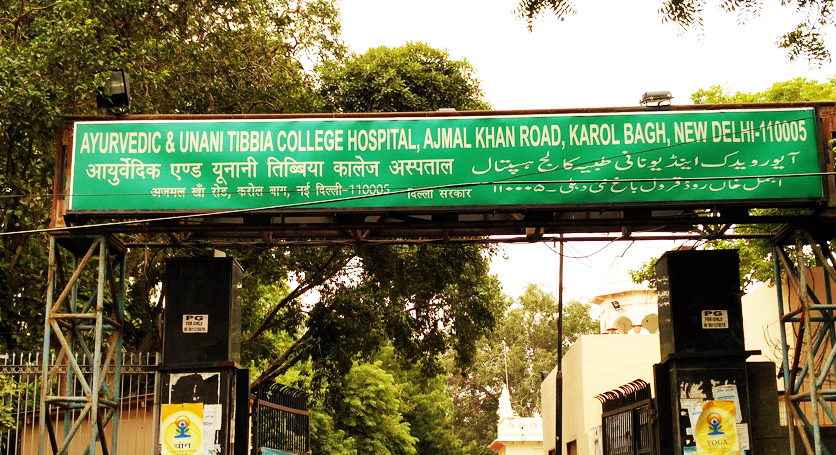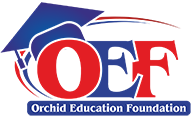
Ayurvedic & Unani Tibbia College and Hospital is a historical institution in India also a unique institution where both streams are functioning under one roof. It was started as `Madarasa e Tibbia` in 1883 by Haziq-Ul-Mulk Hakim Abdul Majeed Khan Sahib.
It was formally inaugurated on 23rd, July, 1889 by Mr. R. Clark, the then Deputy Commissioner of Delhi. Study of Modern Medicine and Science was a part of Syllabus of this school. Later on this Madarasa e Tibbia was re-established in a new building at Karol Bagh by Masih-ul-Mulk Hakim Ajmal Khan Sahib. The foundation stone of the institute was laid down by H.E. Lord Harding (the then Viceroy of India) on 29th March, 1916. This institution was inaugurated by Father of the Nation, Mahatma Gandhi on 13th Feb., 1921. College and 300 bedded hospital is located in central Delhi (Karol Bagh). It has three main buildings (Administrative Wing, Academic Wing & Hospital Wing) which are a unique blend of Mughal and British architecture. Apart from College and Hospital, a huge campus of 33.33 Acres of land is having Herbal Garden, Hostels for Boys and Girls, a mini Stadium and staff quarters. Previously this college and allied units were managed by a Board established under Tibbia College Act, 1952. This Act now has been replaced by a new Act known as Delhi Tibbia College (Take Over) Act, 1998 and Govt. of NCT of Delhi has taken over the college w.e.f. 1st May, 1998. Ayurvedic & Unani Tibbia College is a co-educational institute offering under-graduate courses Ayurvedacharya/ BAMS (Bachelor of Ayurvedic Medicine & Surgery) and Kamil-e-Tibb-o-Jarahat/ BUMS (Bachelor of Unani Medicine & Surgery) which are of 5 ½ years duration including one year compulsory rotatory internship; & Post Graduate Courses in Kriya Sharir (Ayurveda Physiology) and Kayachikitsa (Ayurveda Medicine) in Ayurveda stream & in Munafe-ul-Aza (Unani Physiology), Ilm-us- Saidla (Unani Pharmaceutics), Amraz-e-Niswan-wa-Qabalat (Unani Gynaecology & Obstetrics) and Moalijat (Unani Medicine) in Unani stream.
TheInstitution was started by Hakim Abdul Majeed Khan in 1883 in Qasim Jan street, in the old part of Delhi, and was named as Madarasae Tibbia (Medical School). In this school, besides Unani medicine, modern medicine and science was also part of syllabus. It was formally inaugurated on the 23rd, July, 1889 by Mr. R. Clark, the then Deputy Commissioner of Delhi. After his death, his younger brother Hakim Wasil Khan took over the institution in 1903. In 1911, youngest of the brothers, Hakim Mohammad Ajmal Khan got the reins of the institution, and added Ayurveda which was raised to the level of Ayurvedic & Unani Tibbia College & Hospital. He established Hindustani Dawakhana as a trust in 1911 with Vaid Munshi Man Singh as its first trustee. He took special interest in the development of Indian systems of medicine, namely Ayurveda & Unani.
The British Government had intended to ban Indian systems of medicine in favour of Allopathy. Hakim Mohammad Ajmal Khan, a great nationalist and freedom fighter rose to oppose this with All India Vedic and Unani Tibbi Conference, which was founded by him in 1910 to unite all practitioners of Indian systems. Eventually, the ban was lifted in 1916. Hakim Mohammad Ajmal Khan had decided to establish a world class institution of Ayurveda and Unani in Delhi. He travelled to various European countries including England, Austria, Germany to visit the modern medical colleges. He shifted Madarsa-e-Tibbia at the present site in Karol Bagh, New Delhi on a 33.33 Acre plot of Land purchased by him for this purpose. It was renamed as Ayurvedic & Unani Tibbi College which later came to be known as Tibbia (Medical) College. The Lord Harding, the then Viceroy laid the foundation stone of the College on the 29th March, 1916. The College was inaugurated on the 13th February, 1921 by the Father of the Nation, Mahatma Gandhi.
It was run by Anjumane Tibbia, a management board established as a trust by Hakim Mohammad Ajmal Khan. After independence, this College and allied units were managed by a Board established under Tibbia College Act, 1952. This Act has now been replaced by a new Act known as Delhi Tibbia College (Take Over) Act, 1998. Under this Act the College was taken over by the Govt. of NCT of Delhi w.e.f. 1st May, 1998. The College is affiliated to the University of Delhi since 1973, and is one of the faculties under the Faculty of Ayurvedic & Unani Medicine.
Hakim Mohammad Ajmal Khan’s (I863-1927 CE) ancestors, a distinguished family of physicians, popularly known as Khandane Shareefi, had come to India during the reign of Emperior Babar, the founder of the Mughal Empire in India. All members of the family of Hakim Mohammad Ajmal Khan were Unani physicians. The family had been practicing this ancient form of medicine from the time of the Mughal rulers.Hakim Mohammad Ajmal Khan was born on the 12th February, 1863. His father Hakim Ghulam Mahmud Khan was a renowned Unani physician of his times. He learnt Quran by heart and studied traditional Islamic knowledge, including Arabic and Persian in his childhood, before turning his energy to the study of medicine under the wise guidance of his father and seniors, all of them were well-known physicians. His grandfather Hakim Sharif Khan had setup his clinic at his residence named Sharif Manzil, Ballimaran, in old Delhi which was later handed over to Hakim Mohammad Ajmal Khan. Once qualified, Hakim Mohammad Ajmal Khan was appointed the Chief physician to the Nawab of Rampur. No praise is too high for Hakim Sahib, hailed as "Massiha-e-Hind" (Messiah of India) and "a king without a crown". He could affect miraculous cures, and is said to have possessed "magical" medicine chest, the secrets of which were known to him alone. Such was his medical acumen that it is said that he could diagnose any illness by just looking at a person’s face. Hakim Mohammad Ajmal Khan charged Rs.1000 from rich for consultation and a visit. That was his daily fee if he went out of town, but if the patient came to Delhi he was treated free, even if he was a Maharaja or Nawab.Hakim Mohammad Ajmal Khan took much interest in the expansion and development of the Indian systems of Ayurveda & Unani medicine. Hakim Ajmal Khan built great institutions, namely Jamia Millia Islamia College (now a Central University), Hindustani Dawakhana & Ayurvedic Rasayanshala, the Ayurvedic & Unani Tibbia College & Hospital, in Delhi, a Research Institute for R&D on herbal medicines, and a publication division by the name Dafter ul Masih in Tibbia College Campus in order to expand the research and practice, hence, by these efforts, Ayurveda & Unani systems were saved from getting extinction.
He also established females only Madarasae Tibbia Zanana in Qasim Jan street, Delhi which was inaugurated on the 13th January 1909 by Lady Dane, the wife of then Governor of Punjab. His untiring efforts in the field of Indian medicine infused a new force and life into an otherwise decaying Indian medical system under the British regime. He established Ayurvedic and Unani Tibbi Conference in 1910 to unite all Vaidyas and Hakims of his time against the British rule and their efforts to ban all indigenous Systems of Medicines.The life history of Hakim Mohammad Ajmal Khan changed its course from medicine towards politics after he started writing for an Urdu weekly 'Akmal-ul-Akhbar' that was launched by his family in 1886. It was Hakim Mohammad Ajmal Khan who introduced Mahatma Gandhi to the leaders of Indian National Congress on his return from South Africa. He was one of the founding members of Muslim League, but later he left it. At a time when many leaders were arrested, Gandhiji united with him and other Muslim leaders like Maulana Azad, Maulana Mohammad Ali and Maulana Shaukat Ali in the famous Khilafat movement. Hakim Mohammad Ajmal Khan is also the sole person who has had the honor to be elected the President of the Indian National Congress (1921), the Muslim League (1919) and the All India Khilafat Committee (1920) as also the Hindu Maha Sabha. He was also the founder and first Chancellor of Jamia Millia Islamia, Delhi from 1920 till his death. In fact he sustained Jamia from his own finances and he also established Maktaba Jamia to provide fund for Jamia.Hakim Mohmmad Ajmal Khan’s whole life was a portrayal of altruistic service and sacrifice. He was also a poet of Urdu and Persian and wrote under the pen name –Shaida. His book of poetry Diwan-e-Shaida contains very subtle verses and shows a very humane persona. His other book ‘Haziq’, on Unani treatment, is a must read for every aspiring Unani Physician. He has also written 12 Treatise on Unani Medicine.
In 1920 Hakim Ajmal Khan had renounced his government title, Haziq ul Mulk (Healer of the Nation) which was given to him in 1908 and Qaiser e Hind given in 1915 by the British Government. His Indian fans awarded him the title - Masih-ul-Mulk (Messiah of the Nation). Hakim Mohammad Ajmal Khan died on December 29, 1927 while visiting Rampur.Hafiz Hakim Mohammed Ajmal Khan proved to be the most outstanding and multifaceted personality of his era. In 1987, the department of Posts issued a commemorative stamp on Hakim Mohammad Ajmal Khan in the series ‘Freedom Struggle of India’.
His contribution to the cause of India’s freedom, National integration and communal harmony is matchless. He was a sound and far sighted statesman and an educationist of highest caliber. Ayurvedic and Unani Tibbia College & Hospital, in Delhi is a living and thriving memory of this great man.


Questions, Comments, Discussions